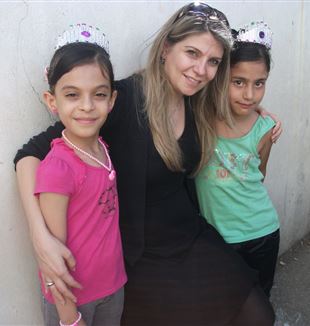
The Border Between Night and Day: AVSI in Lebanon
Since 2000, there's been a 41% increase in the number of refugees, with 244 million migrants and displaced persons on the move. Rana Najib, Education Coordinator for AVSI's $10 million operation Lebanon, spoke of this issue in an interview with Traces.What are the main projects that AVSI is involved with in Lebanon?
We focus on education and the protection of children. We have been greatly aided in this by the Lebanese Ministry of Education, which has greatly facilitated the enrollment of Syrian children in Lebanese schools, and provided special programs for them.
How many Syrian children go to school?
Unfortunately, not many. Somewhere between 20 and 30 percent. According to our friends at UNICEF, approximately 377,000 Syrian children do not attend school at all. Plus there are other challenges. Around the age of 13 or 14, many children drop out of school to go work. We try to meet with the parents to emphasize the importance of education for their children; but poverty is very much an issue, and many parents prefer to have their children leave school and work to bring home some money. Another challenge is cultural: around the age of 13 or 14, some of the girls get married, at which time they leave school and their education ends.
At the UN you said that change will not come through the machinations of leaders, but through the positive experience of people who are different living together.
It’s hard to change the mindsets and agendas of politicians. It takes a long time for that to happen, and in any case it’s not relevant to the circumstances the refugees are living now. So at AVSI we decided to start at the bottom. We can invest in the population living in Lebanon, whether Syrian or Lebanese, and try to have some activities for them to do together, to help them understand each other more and to overcome the fear they sometimes have of each other. So this is our goal, then: to have Syrian children and Lebanese children participate together in school and activities.
Can you give some examples of the activities?
At the UN, I mentioned a one-day festival that AVSI organized in recognition of World Refugee Day. We wanted to bring together Syrian and Lebanese children so that they could meet each other, talk to each other, share their respective cultures and enrich each other’s experience.
So these schools are not just important for learning, say, math and grammar, but for really learning how to share life…
Oh, yes. At first the Lebanese children were reluctant to approach the Syrian children, but over the course of the day they grew more comfortable and started asking questions: What was your life like in Syria? Why did you leave and come here? What is your life like here? At the end of the day we saw some very touching goodbyes between the children.
Do you work with adults as well?
Yes. In addition to the work already mentioned, we teach a kind of “life skills” class for the adults, covering everything from hygiene to getting along with others. We also teach vocational skills – how to sew, how to make soap, etc. We also let them know about opportunities for their children. For example, many Syrian parents are unaware that Lebanon offers free public education for the children.
Why did you get involved in this work?
Before the crisis in Syria erupted, I was working there with the European Union. Our efforts were mainly economic in nature: how to help develop the economy, how to export more goods and increase the GDP, etc. But when the war started, the EU imposed sanctions on Syria and our funds were eliminated. I had wanted to remain, but when I heard that AVSI was launching an education project for Syrian refugees in Lebanon, I felt called to pursue that.
Are people in the camps happy to discover that you are Syrian?
I think so, yes – especially children, but also the parents. They know that someone who understands them and their culture is accompanying them during an ordeal. That someone is trying to help them. This gives them hope.
Your work is exhausting…
Sometimes I feel very tired, yes. But I am fortunate. My second day working for AVSI I visited Bekaa, where there are many tents, many refugees. I was shocked by the living conditions, by the children with no shoes. To know that these people had houses before the war began, the basic necessities, and then to see them living in such dire conditions. I am a wife and a mother, I have a little girl. I cannot imagine her living this nightmare. This urges me and my colleagues on, to work hard, to make changes, to be signs of hope.